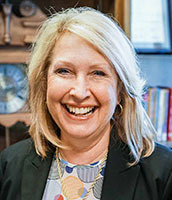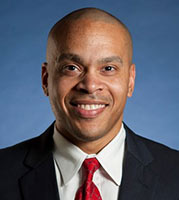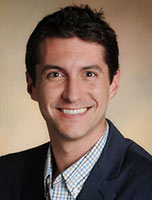Faculty from the EdD in Higher Education Administration Executive Cohort gush about their students, and we couldn’t pick just one! We caught up with three different recent graduates whose roles across the spectrum of higher ed showcase the diversity of the program.
Sherry Chance
 Job Title: Associate Vice President for Global Operations at LeTourneau University
Job Title: Associate Vice President for Global Operations at LeTourneau University
Location: Longview, Texas
UA Online Program: EdD in Higher Education Administration Executive Cohort
Graduation Year: 2017
Fun Fact: Sherry and her husband love to travel internationally, and they (along with their car) can be found in a movie starring, directed and produced by James Franco.
UAO: Tell us about your current role.
SC: It’s a new role for me. Just as I finished the Exec Cohort program – it was a year and a half ago – I came here as associate dean for the School of Business. Just recently I was promoted to associate vice president for Global Operations, which is our online, graduate and hybrid academic programs. My dissertation was about hybrid learning, adult students and online learning, so I have a research background that is uniquely suited to this role because of the program at Alabama.
UAO: What drew you to Alabama’s program?
SC: I was actually looking to return to my alma mater, which was not in Alabama, but I wasn’t thrilled with their program because of the demands it was going to make on me having to commute a couple nights per week for a couple of years. I decided that was just too prohibitive. And I was visiting a friend who casually mentioned Alabama’s program, so I looked into it. And I thought, “Hmm. I can do that kind of program where you go for weekends and you’re not on the road every single week.” So I called Dr. Breaux, and was 99% convinced, and then I met with her in person because I happened to be traveling through the area. When I walked on UA’s campus, met with her and saw what the program looked like, I knew this program was exactly right for me. I thought, “This is the perfect situation. I get to be a University of Alabama student. I can come to this gorgeous campus and partake of things, but it works with my work schedule even though I live in Mississippi three hours away!” It was ideal.
UAO: Has the program helped you progress in your career?
SC: Oh yes, 100%. I was in a director role when I started the program. When my institutional supervisors found out I was pursuing my doctorate, they promoted me to an assistant dean position. And of course the new roles I’ve attained and been promoted to since then are absolutely because of my program at Alabama.
UAO: What was your favorite thing about the program?
SC: It’s a perfect blend of learning modalities. Even though it is a distance program, no quality was sacrificed for the sake of delivery. With technology and the other resources available, they’ve ensured that you’re getting a quality education where hybrid delivery doesn’t compromise institutional prestige and rigor. And the cohort model works beautifully. It really allowed my classmates to bond and feel like we were all running the race together – from all over the country! It definitely enhanced my learning experience and helped me to grow as a person, both professionally and personally.
UAO: Have you maintained contact with any friends from the program?
SC: Yes! I actually finished talking to Dr. Breaux not too long ago – I like to stay in contact with her and in the loop on what’s happening at the University. And just since you and I have been talking, one of my cohort members was calling me. We have cheered each other on as we finished the program and defended our dissertations. We continue to stay in touch to support each other with new endeavors.
UAO: What advice do you have for people who may be considering the Exec program or who are currently enrolled?
SC: Embrace the moment and go for it. There’s never a “perfect time” to do it, so why not now? Don’t make excuses, just do it! And once you’ve made up your mind to do it, persevere and endure. That’s the advice my husband gave to me – it’s all about endurance and it’s for a period of time. Just persevere and endure; you can do it. Get your support system together, whether it’s family, friends or co-workers, lean into them and let them support you. Celebrate that you’ve got this great opportunity to follow your dream and achieve this goal. Honestly, if I could go back and do anything differently — I mean this from the bottom of my heart — I wish I had done this sooner! It was fantastic. I loved it so much. Roll Tide!
Harold Goss
 Job Title: Associate Director of Athletics for Academics at Samford University
Job Title: Associate Director of Athletics for Academics at Samford University
Location: Birmingham, Alabama
UA Online: EdD in Higher Education Administration Executive Cohort
Graduation Year: 2018
Fun Fact: Harold loves ‘80s music and the Rocky movie collection. In fact, the Rocky soundtrack occupies a permanent place in his car’s six-CD stereo.
UAO: Tell me about your role as associate athletic director for academics.
HG: My job is to provide the academic support and resources that about 350 student athletes need to succeed academically. A large piece of that is handling NCAA bylaws and within the framework of that, we monitor their academic progress in conjunction with the registrar’s office, and we also provide academic mentoring and tutoring. We work closely with faculty across campus to identify issues as early as possible so that we can intervene and help students succeed.
UAO: Tell me about your career path and what led you to pursue the EdD.
HG: My master’s degree is in library science, and I worked as a librarian at Auburn for a few years and had an opportunity to come to Samford as a library instruction coordinator and then later as a department chair. In that capacity, I served on various committees across campus, including on the Faculty Athletics Committee, and then I was eventually asked to serve as the Faculty Athletics Representative. Through that, when my predecessor retired, I was asked to consider serving in my current role. I was very intrigued by that because many of our minority students are clustered in athletics, so it would allow me a unique opportunity to work more closely with all student athletes, but in particular that group, and hopefully to make a difference. And the EdD had been in the back of my mind for a long time, and quite frankly, there was never going to be a convenient time to do it. So I just decided it was time to move forward and make that happen, and after looking at different programs, I ended up choosing UA, and let me tell you – it was one of the best choices I ever made.
UAO: Can you tell me what drew you to Alabama’s program?
HG: Well, there are different ways you can go about pursuing that degree. And for me, being married with a full-time job, having a two-year-old and a six-year-old, the options that required two or three nights a week every single week would’ve been just too disruptive to my life, both professionally and personally. UA’s format where instruction hours are clustered into one weekend a month, Thursday, Friday and Saturday – that was really appealing to me. I talked to my supervisor at work, and also my “supervisor” at home, and we all thought it was something we could live with.
And also, I’ll be honest, the brand. The University of Alabama is a flagship institution with a fantastic reputation, and if I was going to put this kind of work into a program like that, I wanted it to be a degree that I was confident people would respect, and I certainly feel like that’s the case.
UAO: How has the program helped you in your career?
HG: The program has equipped me with the perspective necessary to approach challenges – with students or within my department – and to think outside of my own unit. Discussing coursework with classmates who work in various departments across their institutions allowed me to see that we all feel similar frustrations in higher ed, and it opened up channels for me to be able to collaborate and find solutions that are more holistic and serve the entire institution, and not just one department within it.
UAO: What was your favorite thing about the program?
HG: The relationships. That’s with professors and the program coordinator who are all extremely supportive and nurturing, and it’s also with my classmates. The cohort model created space for meaningful relationships with my classmates. We all continue to stay in touch collectively as a group, and then there’s a couple folks in class that I stay in touch with pretty closely. I also really appreciated that in every single class I took – and I’m sure all my classmates could say this – I felt very respected and valued. I felt comfortable and willing to share my opinion and thoughts in conversation even if they were different than the professor’s or another classmate’s. The professors did a really good job of allowing that, and it created an environment for fun, interesting and challenging conversations, which I appreciate.
UAO: Do you have any advice for current students?
HG: Worry less about assignments that are a semester or two away. Focus on what’s in front of you, and then move on from there. Worrying too much about your dissertation when you’re a month into the program can cause undue stress. Trust the faculty; they know what they’re doing. Focus on taking each step successfully, and know that the faculty is there to walk you through each step of the program.
Ronnie Hebert
 Job Title: Dean of Students, The University of Alabama in Huntsville
Job Title: Dean of Students, The University of Alabama in Huntsville
Location: Huntsville, Alabama
UA Online Program: EdD in Higher Education Administration Executive Cohort
Graduation Year: 2017
Fun Fact: Ronnie has an eight-year-old lab named Dudley, who got a shout-out in his dissertation.
UAO: Tell us what it’s like to be dean of students.
RH: I have oversight of student health services, university recreation, all of student life – including fraternity and sorority life, student conduct, veteran services, and our Early Alert program, as well as career services. I often tell parents at orientation that if it doesn’t take place in a classroom, residence or dining hall, I probably have something to do with it.
UAO: What led you to pursue your EdD?
RH: When I started the program, I was an assistant director at the University of Southern Mississippi in the First Year Initiative program. I had been out of school for about three years since completing my master’s degree, and I was feeling the itch of wanting to be back in the classroom. I knew higher ed was “it” for me, and if I was going to make that commitment, I wanted to be as knowledgeable and educated as possible in the field so that I could serve my students, the parents and my fellow colleagues to the best of my ability. So that’s really what drove my interest in pursuing a program. And just from a Google search, I found UA’s program, and when I investigated it I found that with the weekend format to allow me to pursue this while working full time and then with the cohort model, it really checked all my boxes.
UAO: How did you get from being an assistant director at Southern Mississippi to your current role?
RH: There’s been a lot of movement and transition in my career since starting the program. While in the Exec program, I actually transitioned to UA and worked in Student Affairs in the First Year Experience and Parent Programs office, first as the assistant director and then the director. Once I completed my coursework, Calhoun Community College in Huntsville sought me out for a totally different division at a different institutional type, in academic affairs as the director of academic advising. Being the perpetual student that I am, I wanted to give that a shot, so I packed all my things and moved to Huntsville! And I learned that I really enjoy being on the student affairs or student life side of things, and that led me here to the dean of students role at UAH.
UAO: That is a lot of transition, but it all sounds like good movement. In addition to equipping you with the credentials necessary for some of that upward mobility, how has the Exec program enhanced your methods?
RH: It offered me the opportunity to learn from other professionals in the field. I was in a cohort for two years of coursework where one weekend every month, I was surrounded by other higher ed professionals in different functional areas, in different states, all sitting around in a circle discussing and sometimes debating higher ed policies and practices. There’s nothing more educational than that experience. I learned a great deal from our faculty and my colleagues’ diverse set of experiences, which gave me a full 360 view of every issue that higher ed faces. It’s given me a wider breadth of approaches in tackling my day-to-day challenges.
UAO: And have you stayed in touch with your colleagues from the program?
RH: Absolutely. Out of the twelve in my program, there are two or three that I stay in touch with either biweekly or monthly. And then I am confident that Dr. Breaux and Dr. Holley are always just an email away, and we are probably in contact every couple of months. There’s always a back-and-forth going on between us, which I really appreciate. Looking back, I am very appreciative of the value of the relationship as colleagues that was created by the program – with faculty and classmates.
UAO: And other than the relationships, what’s your favorite thing about the program?
RH: Two things! The study abroad component is a unique part of the program that I was excited about, but I didn’t initially understand the value of it until we were on the trip and then in reflection afterward. Our trip included three or four institutions of higher education in the Netherlands and Belgium, and it showed how culture can impact higher ed. It demonstrated the vast diversity of higher ed from a global perspective, and the time spent with my colleagues and faculty on that trip was incredibly valuable to the experience.
And I’m probably an outlier in that I loved the dissertation process. I had a really great dissertation chair, Dr. Holley who really has become a mentor of mine in terms of qualitative inquiry and research. I loved that whole experience. It certainly had its ups and downs, but collectively and as a whole, I really enjoyed that process.
UAO: Do you have any advice for current or prospective students?
RH: It’s good to consider that this experience is not something you can just add to your plate. You have to remove some things from your plate to make room for the commitment. It is 100% worth it, but there is a transition period where you start to realize, “OK, wow, I’ve taken on this enormous task of completing a doctoral degree while also working full time. What am I going to sacrifice to make the time for it?” And you have to do that; you have to make room for it.
Second, everybody has a different mode of completing the work in between class meetings, so find what works for you. For some people, it’s doing a little bit each week, and for some it’s a high intensity weekend where you get it all done, and then it’s a break until your next class. Try all the different ways and find what works best for you. But again, as you do these things, know that this program is completely worth it. It’s really been one of the highlights of my professional career so far.
For more information about the EdD in Higher Education Administration Executive Cohort, please visit the program website.
Published: August 30th, 2020

